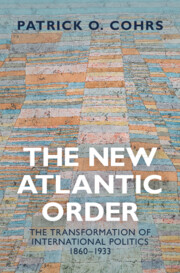Book contents
- The New Atlantic Order
- The New Atlantic Order
- Copyright page
- Dedication
- Contents
- Acknowledgements
- Abbreviations
- Maps
- Introduction
- Part I Inevitable Descent into the Abyss?
- Part II The Greatest War – and No Peace without Victory
- Part III Reorientations and Incipient Learning Processes
- 10 Towards a Progressive Atlantic Peace of the Victors
- 11 The Search for a New Equilibrium – and an Atlantic Concert
- 12 The Search for Security and an Atlantic Alliance of the Victors
- 13 A New Beginning?
- Part IV No Pax Atlantica
- Epilogue The Political Consequences of the Peace
- Bibliography
- Index
11 - The Search for a New Equilibrium – and an Atlantic Concert
The Reorientation of British Approaches to Peace and International Order
from Part III - Reorientations and Incipient Learning Processes
Published online by Cambridge University Press: 22 April 2022
- The New Atlantic Order
- The New Atlantic Order
- Copyright page
- Dedication
- Contents
- Acknowledgements
- Abbreviations
- Maps
- Introduction
- Part I Inevitable Descent into the Abyss?
- Part II The Greatest War – and No Peace without Victory
- Part III Reorientations and Incipient Learning Processes
- 10 Towards a Progressive Atlantic Peace of the Victors
- 11 The Search for a New Equilibrium – and an Atlantic Concert
- 12 The Search for Security and an Atlantic Alliance of the Victors
- 13 A New Beginning?
- Part IV No Pax Atlantica
- Epilogue The Political Consequences of the Peace
- Bibliography
- Index
Summary
Chapter 11 reappraises the peace conceptions and reordering strategies of Lloyd George and the other architects of the British agenda for the Paris Peace Conference. It argues that what they envisaged centred, not on containing Germany and re-establishing a workable balance of power but rather on the novel aim to create, in cooperation with the United States, a new Atlantic concert that was to stabilise a modern international equilibrium within a recast global order. It illuminates the underlying assumptions and rationales of what became an ambitious British peace programme, which included the most elaborate and influential blueprints for a League of Nations as framework for a novel, and integrative, international concert. And it highlights that British approaches to peacemaking, which were also designed to bolster the British Empire and expand British imperial influence in the Middle East, evolved and changed significantly between the armistice and Versailles as well. Finally, it analyses the extent to which Lloyd George and other key actors like Robert Cecil and Jan Christiaan Smuts had embarked on constructive learning processes – and the extent to which their evolving concepts and strategies were conducive to the creation of a durable and legitimate Atlantic and global order.
Keywords
- Type
- Chapter
- Information
- The New Atlantic OrderThe Transformation of International Politics, 1860–1933, pp. 425 - 478Publisher: Cambridge University PressPrint publication year: 2022

